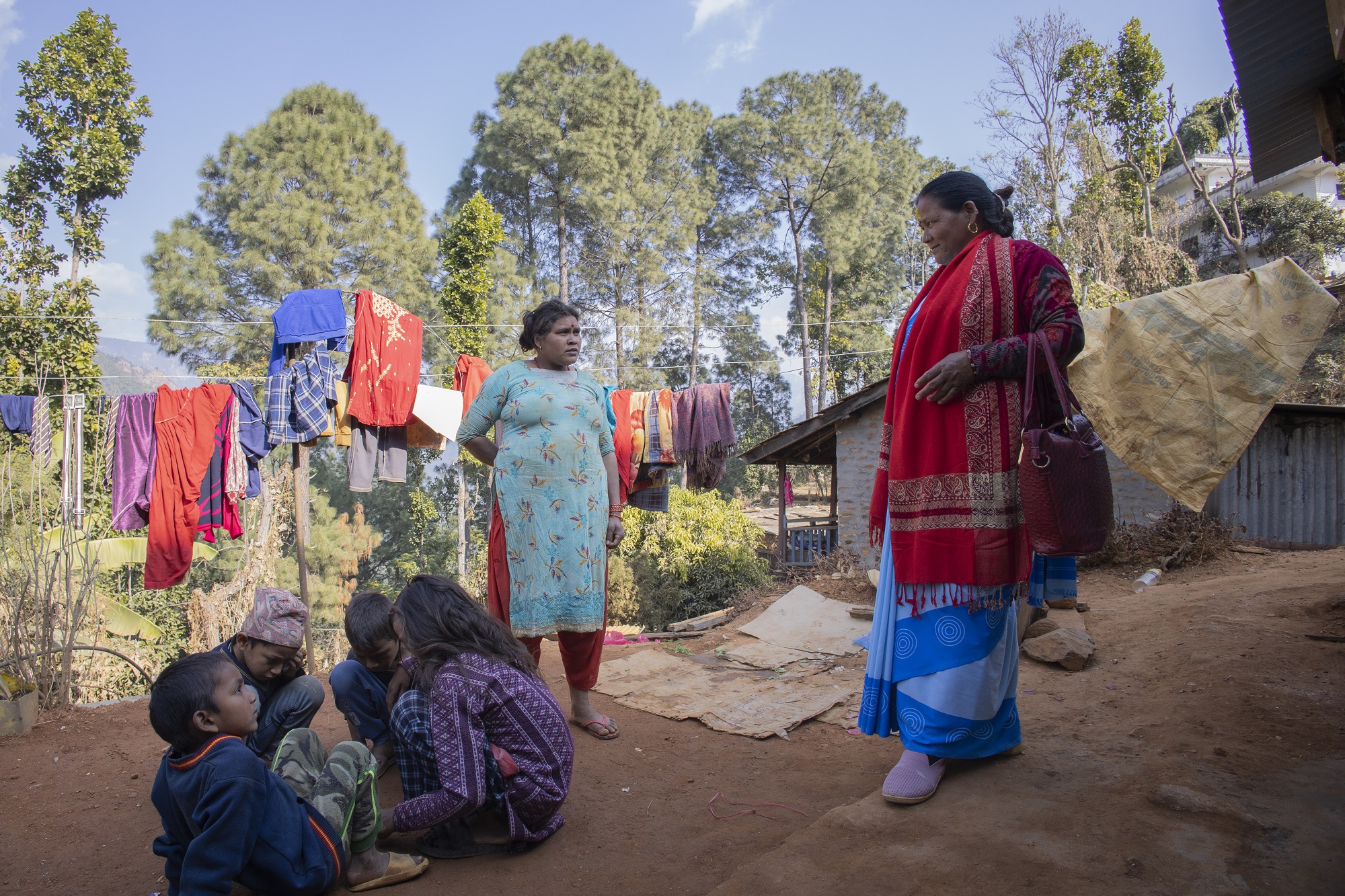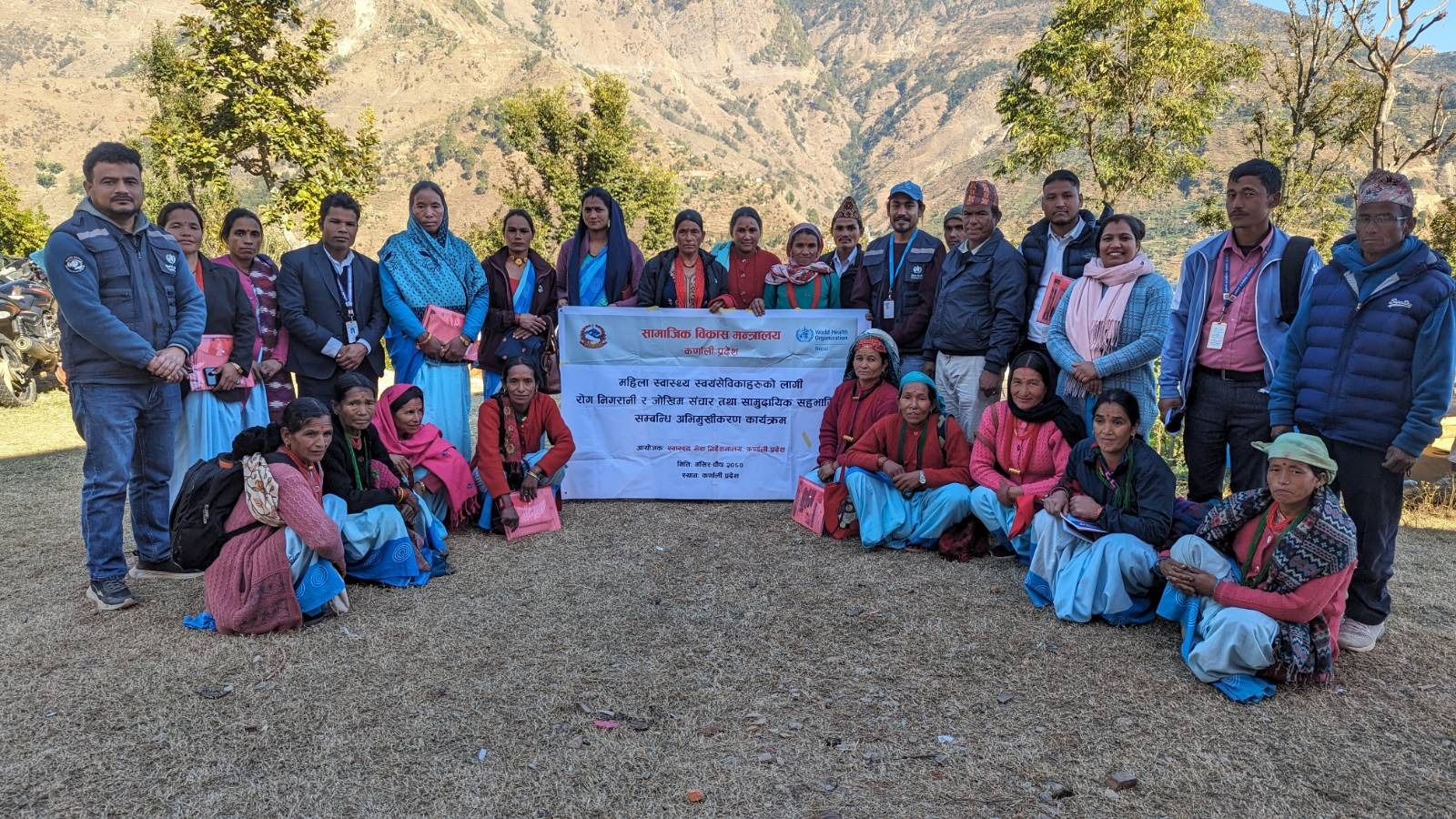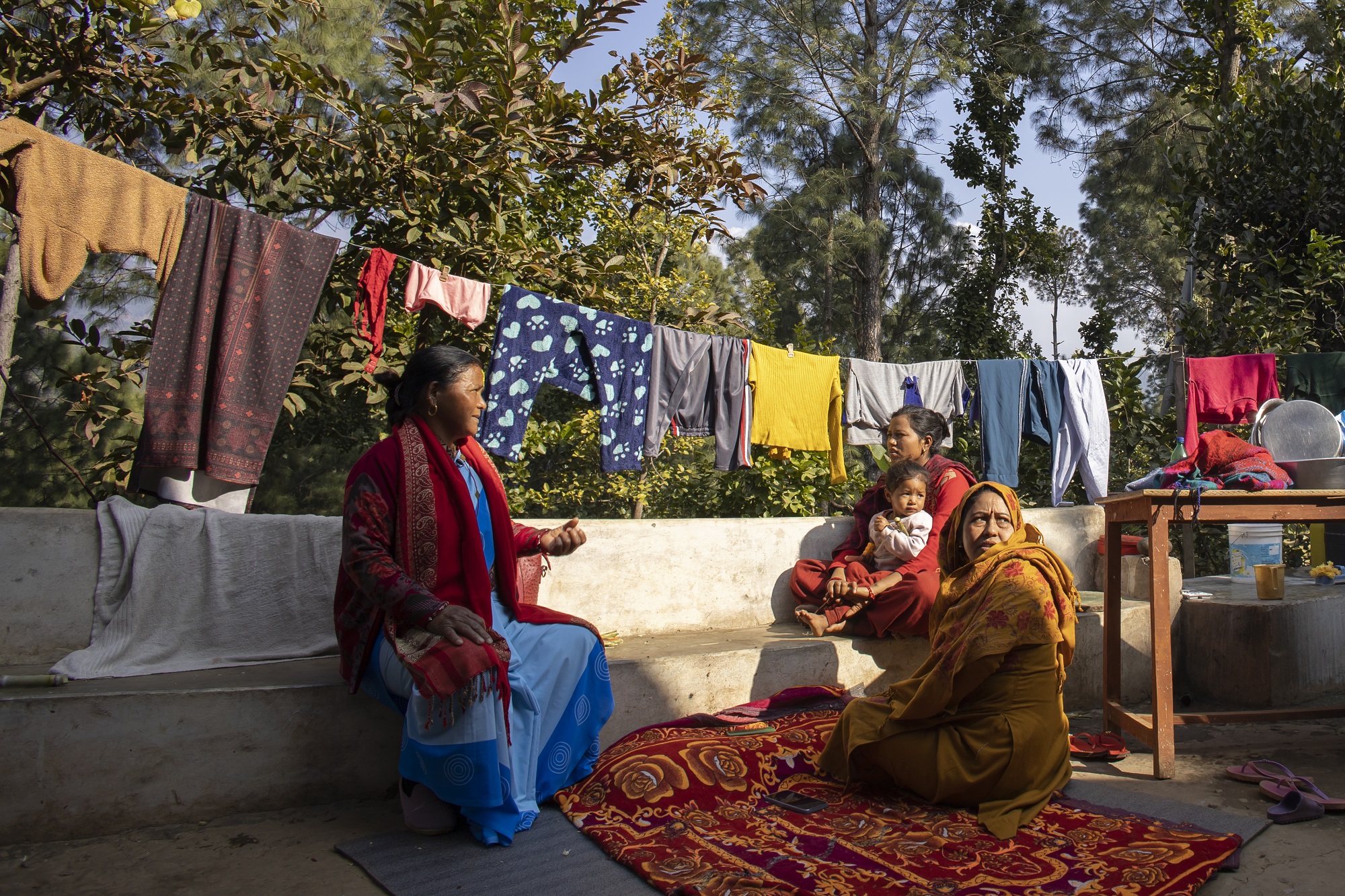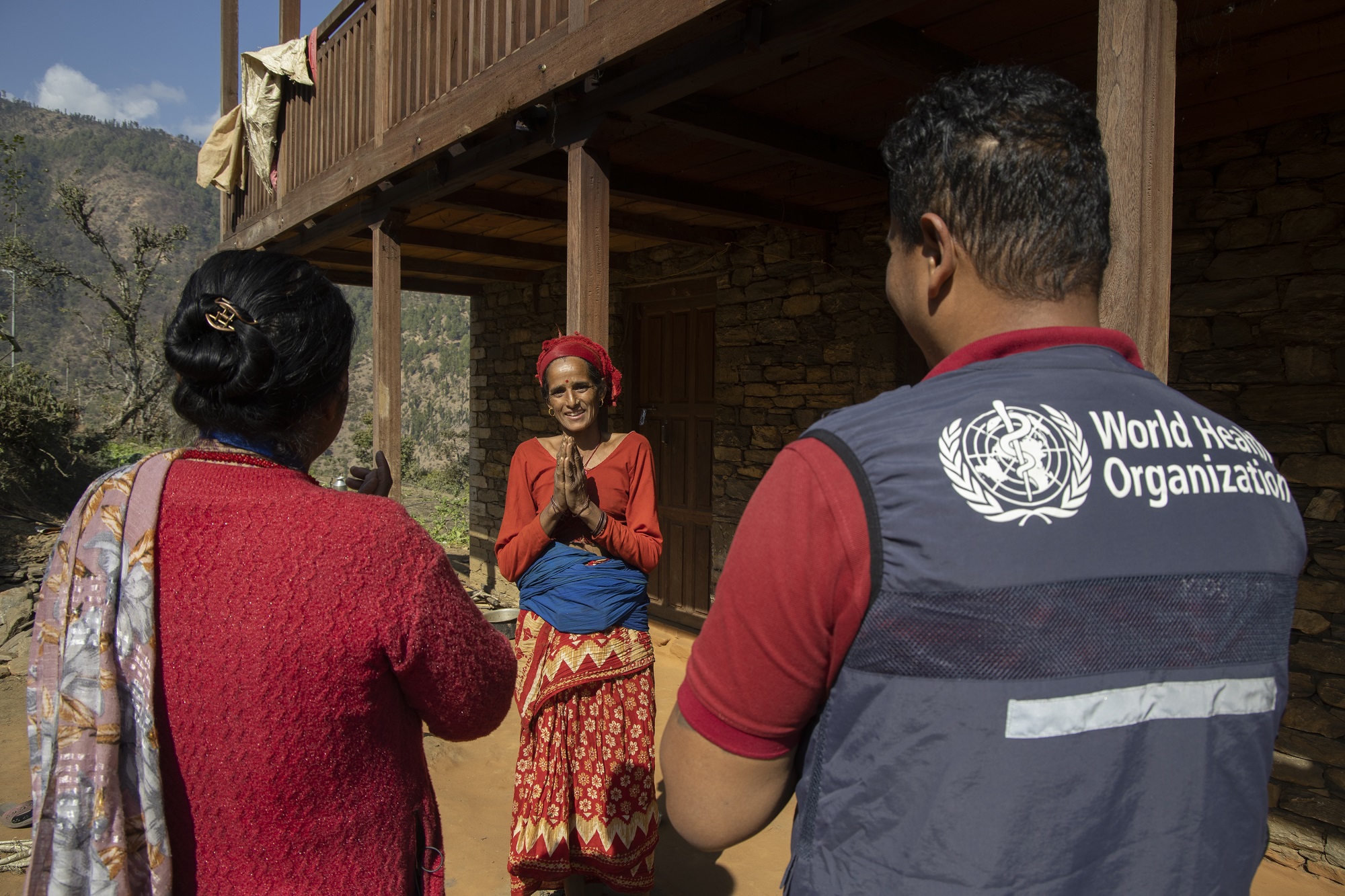Jajarkot and West Rukum District, Karnali Province
Community-based surveillance (CBS) serves as an effective tool for early detection of epidemic-prone diseases and public health events, particularly in the aftermath of a disaster such as an earthquake when facility-based routine surveillance experiences disruptions.
Recognizing this importance, the Ministry of Health and Population (MoHP) with the Provincial Health Directorate, Karnali Province, and WHO held a series of capacity-building workshops for Female Community Health Volunteers (FCHVs) serving in earthquake-affected municipalities of Karnali Province on recognizing and reporting unusual and unexpected health events, reporting syndromic surveillance data, and conducting risk communication and community engagement (RCCE) activities.

Padma Kumari Shahi, a Female Community Health Volunteer, interacts with a community member during a door-to-door visit at Thaple, Bheri Municipality - 3, Jajarkot. Photo credit: WHO Nepal/B.Rai
FCHVs are community-level health workers in Nepal, known for their role in strengthening health promotion and the delivery of basic health services, particularly in underserved or remote communities. Additionally, FCHVs are essential stakeholders for community-based surveillance. Community-based surveillance involves the monitoring of signs and symptoms in the community, to detect potential disease outbreaks such as outbreaks of acute watery diarrhea, clusters of febrile illnesses, or clusters of health events due to an unknown cause in the community.

A group photo of participants from the training held at Junechande Rural Municipality, Jajarkot, Karnali Province. Photo credit: WHO Nepal
More than 300 FCHVs and 127 local health facility-in-charge were oriented during the workshops conducted in Jajarkot and Rukum West last December. Six sessions were held in Jajarkot while three were held in Rukum West between 12 to 18 December 2023. During the workshop, the FCHVs were trained on the basics of identification, syndromic detection, and verification of potential health signals that can lead to large public health emergencies.

Padma sharing recommendations on how to stay safe from cold and diarrhea in the winter season, during a door-to-door visit at Thaple, Bheri Municipality - 3, Jajarkot. Photo credit: WHO Nepal/B.Rai
Padma Kumari Shahi, an FCHV with a decade-long experience working in Bheri Municipality of Jajarkot, says since the start of the winter season she has been receiving around 12-15 calls per day from community members informing her about the rise in pneumonia cases.
"As FCHVs, we are always on alert for potential outbreaks, and since the earthquake and the training, we are now even more focused," says Shahi.
FCHVs were also sensitized on the principles of RCCE such as the importance of listening to communities, building trust, tailoring strategies, and interventions based on community needs and context. A separate session on WASH and the significance of promoting good hygiene practices for the prevention of waterborne diseases was also provided.
“We are usually the first point of contact for families to call regarding health issues, and we provide the necessary details, including information on nearby health facilities and recommended medicines,” says Hari Kala Jaisi, another participant of the training, working in Bheri Municipality - 3, Jajarkot. “Through this training, I learnt that we should immediately alert our health in-charge or contact the toll-free number, 1115, provided by the Epidemiology and Disease Control Division, where we can alert authorities about serious cases or potential outbreaks. This way, prompt actions can be taken.”
 Hari Kala Jaisi (left), a Female Community Health Volunteer, and a WHO Emergency Surveillance Associate, greets a community member at Lamakatiya, Bheri Municipality - 9, Jajarkot during a door-to-door visit. Photo credit: WHO Nepal/B.Rai
Hari Kala Jaisi (left), a Female Community Health Volunteer, and a WHO Emergency Surveillance Associate, greets a community member at Lamakatiya, Bheri Municipality - 9, Jajarkot during a door-to-door visit. Photo credit: WHO Nepal/B.Rai
These trainings received support and coordination from the Health Emergency Operation Centre, MoHP; Provincial Health Directorate; Provincial Health Emergency Operation Centre of Karnali Province (PHEOC); and the health section chief of Jajarkot and West Rukum municipalities. WHO Field Medical Officers and surveillance associates provided technical support to the PHEOC and municipalities in the targeted municipalities.
“To foster community recovery in the aftermath of disasters, it is imperative to establish resilient community health workers, and such training and engagement brings us closer to a holistic and resilient health system in the community. Learnings from the training will strengthen the foundation against community health threats and advance the frontier of disease surveillance," says Dr Rabin Khadka, Director, Health Service Directorate, Karnali Province.
 A WHO Emergency Surveillance Associate (left) and Hari Kala Jaisi (right), a Female Community Health Volunteer, inquiring about the health status of the community during a door-to-door visit at Lamakatiya, Bheri Municipality - 9, Jajarkot. Photo credit: WHO Nepal/B.Rai
A WHO Emergency Surveillance Associate (left) and Hari Kala Jaisi (right), a Female Community Health Volunteer, inquiring about the health status of the community during a door-to-door visit at Lamakatiya, Bheri Municipality - 9, Jajarkot. Photo credit: WHO Nepal/B.Rai
"Female community health volunteers are an integral part of Nepal's health care system. Due to their rich understanding of the local context and the trust they enjoy within their communities, they're perfectly placed to support outbreak detection and prevention activities,” says Dr Rajesh Sambhajirao Pandav, WHO Representative to Nepal.
Since the first day of the West Nepal earthquake, WHO has been working closely with the MoHP to support urgent health needs of the affected population and will continue to assist the provincial health authorities in various response activities, including disease surveillance, partner coordination, health information planning and documentation, infection prevention and control, vaccination, and continuation of essential health services.
These activities are supported by the South-East Asia Regional Health Emergency Fund (SEARHEF) and Contingency Fund for Emergencies (CFE) which enables WHO to provide quick and efficient response to emergencies.
You can read more about WHO's support here.
